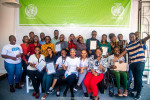Hackathon is an innovation competition where teams look for solutions to one or several challenges in a short period. Hackathons often combine multi-disciplinary and one-time team collaboration. Solutions are usually produced during a hackathon, and participants are mentored by experts. Hackathons are an ideal setting for young people to learn how to tackle complex real-world challenges and innovate solutions that require a multidisciplinary approach.
Advancing SDGs together - Finland and Tanzania cooperate for sustainable development
UN Associations in Finland and Tanzania boast a long and fruitful history of cooperation in carrying out projects that strengthen the role of young people and the participation of society as a whole in the implementation of sustainable development goals. The Climate Hackathon in September was organized as a joint project in an ongoing four-year project Accelerating Sustainable Development Goals Implementation in East Africa (2021-2024).
The goal of the hackathon innovation event was to bring together young aspiring professionals and students from various fields to learn from one another and innovate solutions for climate resilience and risk reduction in Tanzania, where the effects of climate change are already visible. Africa produces only 2–3 percent of the world's greenhouse emissions but suffers from the consequences of climate change many times over compared to its share of emissions.
The hackathon received over 200 registrations, from which then 30 individuals forming nine teams were selected to join the event both online and in person in Tanzania and Finland. “The event was unique for us since we hadn't done anything similar where we bring people together from two physical locations in two different countries and online as well,” states Jenni Kauppila, the Advocacy Work Officer from UNA Finland.
Developing innovative solutions through mentoring, peer-learning, and expert consultations
During the three-day event, each of the nine teams chose a more narrow challenge to focus on in climate resilience and were mentored by employees from UNA Finland and UNA Tanzania. Teams had an opportunity to discuss their potential solutions with Mr. Mohamed Mwabumba, a senior expert and a meteorologist at Tanzania Meteorological Authority specializing in land use and management, atmospheric sciences, and meteorology. Moreover, teams from both countries engaged in peer-to-peer learning and knowledge sharing during the event.
Out of the nine innovative solutions and excellent presentations, one team from each country was chosen as the winner. In Finland, young professionals Enzo James, Marine Beaumel, and Sofia Koralli adopted an ambitious agroforestry approach to tackle several climate issues with one multifaceted solution. The solution encompassed a cooperative system including a Community Center or a Central Hub where local people could share information, training, food storage, weather warnings, renewable energy, and bio-waste collection for fertilizer purposes. The end users of this solution were the Tanzanian small farmers and villagers, including children. The team built a practical prototype with a timeline from 2022 until 2030, which the judges appreciated and considered sustainable and realistic. The idea of a cooperative approach would bring the community and its members to the center of the activity. The winning team won a prize to visit The Finnish Meteorological Institute to discuss their operations and potential trainee programs. The Hackathon Project Coordinator Sofia Åberg is extremely pleased with both the winning team that she mentored as well as the many impressive accomplishments by all teams, innovative ideas, and the great atmosphere during the weekend.

The winning team from Tanzania invented a solution to a challenge of weather warning systems. In Tanzania, climate change will increase drought, floods, long periods of heat, rising temperatures, heavy rains, and rising sea levels. Around 80% of the population is out of reach regarding warnings about extreme weather events. The Tanzanian winning team’s solution consisted of a system with various communication methods for the public: SMS alerts, social media, and public announcements utilizing, for example, Village Centers in Tanzania. In their solution pitch, the team presented their coded prototype of the SMS system, which the judges congratulated.
The prize for the winning team in Tanzania was to attend a Bootcamp hosted by the United Nations Association of Tanzania to develop the solution with experts further. The top three teams in Tanzania will be able to continue the work with their answers and receive support and input from expert networks. All top 3 teams’ solutions focused on alert systems about extreme weather events and community education about agroforestry.
Tehdassaari - an ideal site for sustainability innovation
The Climate Hackathon organized in September was implemented in a hybrid format. Participants could join the event online in Dar es Salaam in Tanzania or attend the event site in Tehdassaari, Finland, on the premises of one of the partners, Cireco. Cireco Finland is a circular economy and sustainable development consulting company, and its location, Tehdassaari, is a cultural heritage island where the Nokia company was founded 150 years ago. Cireco Finland's goal is to protect this historical place and develop a sustainable urban area for local companies and communities. Cireco Finland plans to organize hackathons regularly in the future. Such events have great local significance for the development of the Pirkanmaa region and international importance for promoting the Agenda 2030 for Sustainable Development. In addition to Cireco Finland, the partners in the hackathon were the University of Tampere, the Finnish Meteorological Institute, and the innovation and entrepreneurship center HUBSTRE.
Comments from Hackathon participants:
“Thank you for making this kind of event possible. I enjoyed it a lot and learned a lot as well in the process.”
"The program was well arranged, and the mentors did their job well; I had fun there.”
The United Nations Association of Finland and the United Nations Association of Tanzania would like to thank everyone who attended the event as well as our partners for making this event possible. We are happy to announce that a similar event will be organized in the future. Stay tuned!

